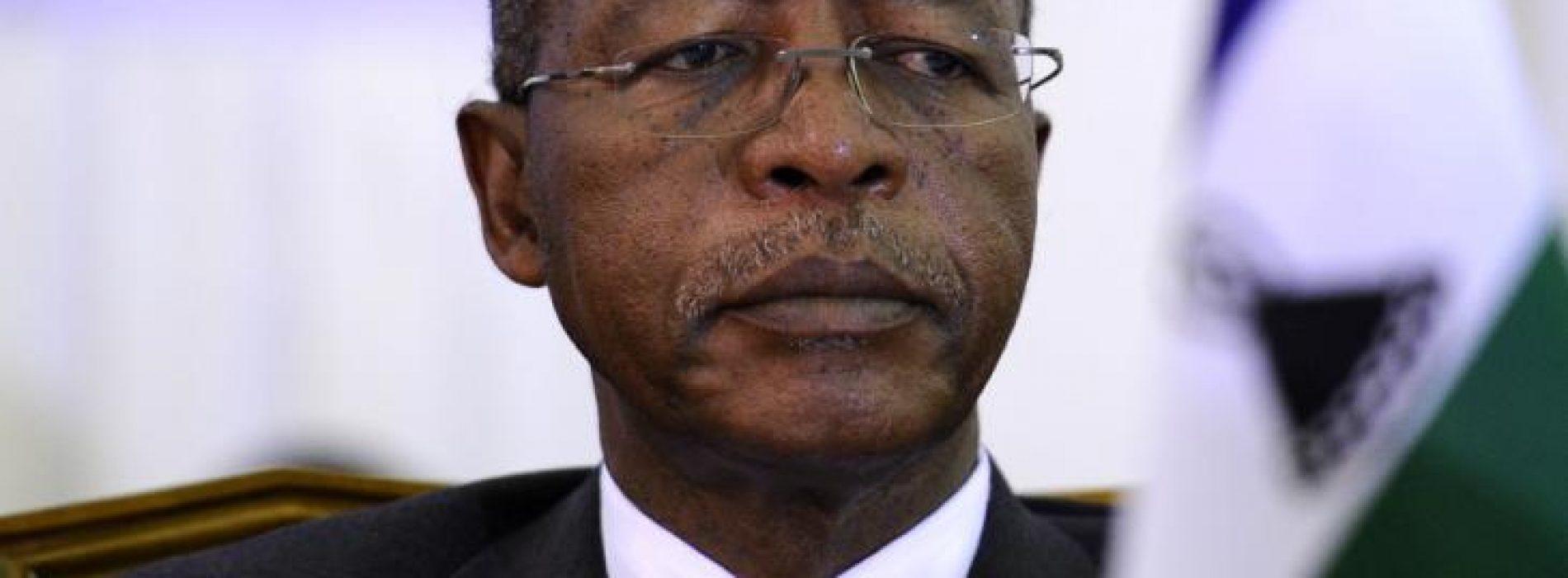Africa-Press – Lesotho. Towards an Explanation of Political Stability during Colonial Rule
Apart from chiefly land disputes between Lerotholi and Maama (1893-94)—itself an indication of land scarcity—and power struggle between Lerotholi and Masupha (1898), it is evident that, particularly after 1884, there was much political stability in colonial Lesotho.
Reasons for this political stability must be many, and must include the fact that, having dubbed Basutoland “a prickly hedgehog” because of the level of Basotho’s political activity in the territory, the British were careful to avoid any action that might incite political instability.
However, more important reasons for political stability in Lesotho during colonial rule must be that, in administering its colonies, Britain brought to bear the enormous resources of statecraft that it possessed.
Britain was the world’s superpower and, in some cases, it was enough for its officials throughout the world to invoke this reputation to secure other societies’ acceptance of British policies and wishes.
Further, as a dominant player among authors of the order that was emerging in southern Africa, the British were much more conversant with the character of that order than African societies.
This gave them an enormous advantage not only to shape the emerging order but also to anticipate coming changes, and to determine and provide resources that were needed.
Within the colony of Basutoland, the government maintained stability by use of a combination of force, on the one hand, and co-optation, on the other. Force took a form of establishment of a police force, prisons, and attendant institutions and processes.
It should not surprise us that, in the very first requisition for material sent to the Cape Colony government by the newly-established colonial government in Lesotho, handcuffs topped the list; and that, prisons were some of the earliest colonial buildings to be constructed.
Co-optation was used on Lesotho’s dominant group, the chiefs. For much of the colonial period, the chiefs had, and benefited from, a close relationship with the colonial government and a colonial policy of parallel rule which left them in charge of spheres of rule from which they created economic opportunities for themselves.
This worked and, consequently, the chiefs were quiet for much of the colonial period. Regarding voices of discontent from among organisations of the commoners, Basutoland Progressive Association and Lekhotla la Bafo, the quality of intelligence available to government was good, and enabled colonial state to snuff-out threats to political stability, and protests were largely civil.
Perhaps more importantly, the policy of government was to avoid an accumulation of political and social pressure to a point of explosion. So, for example, after Basotho commoner elites established the BPA, in 1907, they demanded representation in the chiefly-dominated Basutoland National Council (BNC).
The government turned down their requests, and insisted that chiefly representation was for the benefit of all Basotho. A decade later, LlB was formed, and started demanding, among others, representation in the BNC.
Faced with two sources of pressure and fearing they might combine forces, the colonial government allowed BPA representation in the BNC, and responded to LlB’s demand by saying BPA representation benefited all commoners.
This decreased the possibilities of the two organisations working together, and reduced any negative impact LlB’s activity could have on political stability. Migrant labour was probably the most important instrument for securing political stability in colonial Lesotho.
It enabled people who lived in a small, overcrowded territory with marginal land, to find employment elsewhere, and to support livelihoods of families and relatives left in overcrowded territory.
At state level, revenues from the Southern African Customs Union, SACU—that vestige from the period of annexation—made public expenditure possible and made life in the colony not too intolerable—and even bearable—and thereby assisted colonial government’s efforts to maintain political stability.
On the whole, however, it has to be acknowledged that, throughout the colonial era, the colonial government maintained a general policy of ‘borderlessness’ between Lesotho and South Africa—signified by only minimal immigration controls between Lesotho and South Africa—until July, 1963.
This must have contributed to political stability by reducing both the sense and the realities—such as ‘national’ exclusion, tighter restrictions on movement and access—that came with independent statehood.
Political Instability of the Post-Colonial State
We have to start from recognition that, as Britain granted independence to Basotho, critical instability-inducing circumstances that had made colonisation and annexation necessary, in the 1860s, had not changed.
That Basotho became an independent nation, and their territory an independent state, was not a consequence of any change in Lesotho’s circumstances of the 1860s.
The adjustment of colonial policy—from incorporation to granting Lesotho independent statehood—was made necessary by political conditions that prevailed in South Africa as post-Second World War conditions—including growth of nationalist agitation for independence in Africa—forced Britain into a programme of decolonisation.
It was a change in which political considerations predominated. British government abandoned the plan to incorporate Lesotho into South Africa because of opposition to apartheid in Britain, among African nationalists in southern Africa and international opinion, in general.
The instability-inducing economic and other circumstances which had informed policies of colonisation, annexation and incorporation had not changed for the better when the British adjusted their policy, after the Second World War, and allowed Lesotho’s attainment of independent statehood in the mid-1960s. These circumstances are very well-articulated by James H. Cobbe,[3] among others.
The question, then, becomes: if the British colonised Basotho and what remained of their territory on recognition that, without resources that British colonial rule over the territory brought, there would be political instability in the Mohokare valley, why did they grant independence to the people and their territory under the same material circumstance that had suggested colonisation, annexation and incorporation as the best strategies against political instability?
The argument made in this chapter is that, the decision of the British to grant independent nationhood to Basotho, and sovereign statehood to their country, did not imply that matters had changed from what they were in the 1860s.
It would seem that, in granting Basotho and their territory independent nationhood and statehood respectively, the British were leaving Basotho to consider realities that had forced the British government to annex Lesotho, and determine the fate of their nationhood and the independent statehood of their country.
This is what the country’s ruling elite have failed to do in the last 50 years: to initiate, and provide leadership on, discussions of what to do in the face of Lesotho’s circumstances.
Instead, it has been much easier for them to pretend, or assume, that Lesotho’s circumstances are ordinary. Persistence of political instability of the country strongly suggests otherwise.
Without circumstances that persuaded the British towards annexation being addressed, it has meant that struggles for power in Lesotho take-on a character whose intensity leads to political instability.
How can we explain Lesotho ruling elites’ failure to initiate and lead discussions of what lies at the root of the country’s persistent political instability, and the search for lasting solution? It is clear that part of the answer to this question lies in the country’s political elites’ motivated lethargy, and lack of both political will and imagination.
The status quo serves them better. In his consideration of options available to Lesotho in post-apartheid southern Africa, Jim Cobbe identified ‘vested interest’ of the country’s ruling elite as a stumbling block to coming up with a solution likely to benefit Basotho.
Given this vested interest, he pointed out, Lesotho’s ruling elite will want to keep things as they have been, and resist any change that threatens their positions, even if such change has the potential to end political instability in Lesotho and benefit the majority of Basotho:
why would a Lesotho government seek to continue the status quo, and what are the alternatives? The simple answer to the first question is that those controlling and employed by the state apparatus within Lesotho benefit from it, and are widely assumed to want to continue to obtain those benefits. The unstated assumption is that the alternatives would necessarily involve costs to these elites in Lesotho as compared to their present situation.
Not only have the country’s ruling elite failed to start discussions aimed at determining arrangements that can answer challenges facing Basotho’s nationhood and their county’s statehood but they have failed to seize opportunities which had a potential to bring about political stability in the country.
Examples of these failures would include Lesotho governments’ failure to do what was necessary for implementation of the Joint Bilateral Commission for Cooperation (JBCC) agreements of 2001; and failure to initiate discussions on multiple-citizenship.
Their strategy of resistance is to block any discussion of ideas that threatens their position, by quickly labelling them as ‘selling the country’, or as ‘incorporation’ of Lesotho into South Africa.
A response by a section of Lesotho ruling elites to a request by South Africa to Lesotho government to clarify Lesotho’s position on multiple-citizenship provides a good example of this resistance. Currently, Section 41 of Lesotho’s Constitution is intended to prohibit multiple-citizenship.
Because of their insecurity, Lesotho’s political elite have met the idea of multiple-citizenship with intense hostility, invoking narrow nationalism and the ‘spectre’ of Lesotho’s incorporation into South Africa.
The rhetoric always avoids raising and addressing the concrete issues the direct and indirect consequence of whose subsistence, alone and combined, is political instability.
\Thus, in April 2013, Pakalitha Mosisili (several times Prime Minister but, then, out of power) sought to persuade followers of his party, Democratic Congress, against discussion of the idea of multiple-citizenship, telling them:
There are 46 million people in South Africa comprising Basotho, Shangaans (sic) and Zulus.
If we were to allow for dual citizenship, they would swallow us raw because they will also seek Lesotho citizenship . . . This is one way this . . . government is intending to hand us over to South Africa.
I therefore urge you people to be careful, very careful. Note how, in the illogicality of this narrow and self-serving nationalism, even Basotho who live in South Africa are presented as a threat—enemies, even.
Summary/Conclusions
At the heart of British government officials’ decision to colonise and annex Lesotho were the twin-aims to provide political protection to a tribe faced with extermination, on the one hand, and to secure political stability necessary for British commerce, on the other.
Without such colonisation, political instability would be the order of the day, as their circumstances would force Basotho to eke out a living by violating boundaries imposed through war and conquest.
Ideas and plans of annexation and, later, incorporation, were i
nformed by material circumstances that militated against independent ‘colony-hood’. During colonial rule, political stability was established and maintained, largely, through use of resources that were available to the British Empire.
British government’s granting of independence to Lesotho, in the mid-1960s, was neither a sign that conditions that generated instability in the 1860s—and dictated colonisation—had vanished nor a sign that political stability maintained during colonial rule would continue after independence.
It is argued here that, in granting Basotho and their territory independent nationhood and statehood, respectively, the British were leaving Basotho to determine the fate of their country in the face of material circumstances that militated against political stability. Faced with these circumstances at colonisation, in the 1860s, the British had responded with annexation and incorporation.
Whereas the political instability of the immediate colonisation era took the form of invasion of ‘others’, across colonial boundaries, the post-colonial political instability takes the form of a nation that has turned on itself, as groups in possession of the machinery of state use state institutions and processes against their opponents and those considered enemies.
A large part of the explanation for Lesotho’s persistent political instability lies in the material bases out of which the country emerged in the nineteenth century. These material bases have meant that, the economy is weak and unable to provide to majority of society.
In these circumstances, struggles for power to control and access the little that the economy can provide take-on an intensity whose consequence has been persistent political instability.






